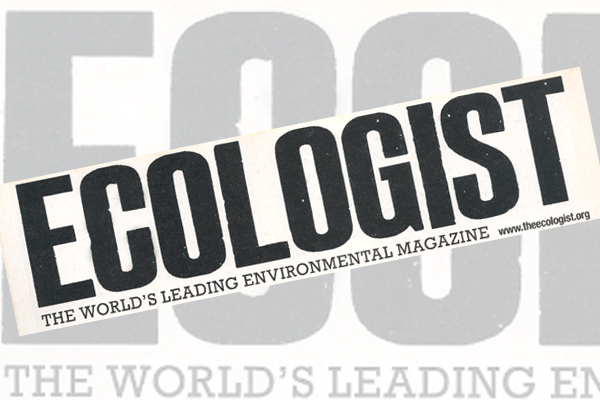Editorial: Food and Sex

Welcome to the new look Ecologist, which, I hope, will make negotiating our monthly cornucopia of in-depth investigations and stories a little easier for everyone.
More important than what’s on the outside, however, is what’s on the inside – which is as thorny as ever. Reading our special investigation on meat I am reminded of Swift’s A Modest Proposal: ‘I have been assured by a very knowing American of my acquaintance in London, that a young healthy child well nursed is at a year old a most delicious, nourishing, and wholesome food, whether stewed, roasted, baked, or boiled…’
In these days of rising food prices, dwindling oil reserves and population explosion, to suggest that we can, even should, continue to eat meat is to be greeted with the same horror (and no doubt endless letters of protest) that greeted that biting satire. But Swift’s ‘solution’ to poverty – that the poor should feed themselves by eating their young – is as simplistic and makes just about as much sense as suggesting, as the near daily onslaught of emails and letters we receive at this office do, that the world can save itself from its current crises simply by not eating meat. Certainly the way we raise livestock is morally reprehensible and wilfully environmentally damaging; but is giving up meat the only, or even the best, solution?
No matter which way we looked at it, the strict veggie/vegan option just did not prove to be the saviour of planet or people. The debate and the data are complex, and in the end it’s not so much what you eat as how it is produced that carries the greatest weight.
Thus, does ruminant flatulence contribute to global warming? Yes, but the argument is one of scale. If we all ate less meat, the methane from ruminants could not be used to distract us from more dangerous polluters.
Is meat-production energy intensive? Yes again, but as Simon Fairlie contends (page 16), only if we accept that industrial scale is the only way to produce ‘enough’ to meet our needs. Does meat contain unhealthy fats we could do without? Richard Young (page 20) argues that industrialised meat – beef in particular – has the highest levels of saturated fats. Meat from grass-fed cows has a dramatically better mix of ‘good’ fats, including omega-3.
The IPCC’s Rajendra Pachauri says cutting out one meat meal a week could save the planet. Compassion in World Farming believes we should cut our consumption by 60 per cent by 2020. Our investigation suggests that figure is spot on for planetary wellbeing and human health. In short, if there is a universal model for healthy eating (apart from local, fresh and organic) it is Michael Pollan’s dictum: ‘Eat food. Just a little. Mostly plants’. But why wait until 2020, when it could be too late? The time to start is now.
Then there’s the issue of sex. Eric Francis’s comment (page 87) about they way chemical pollutants might influence not just the physical manifestations of our sexuality, but the emotional and behavioural ones – literally how comfortable we feel in our own skin – takes us into tricky territory. It’s challenging reading, and yet a recent study at the University of Liverpool found that the Pill may disrupt women’s natural ability to choose a partner genetically dissimilar to themselves. Bad news for the survival of the species. Bottom line, if the food we eat can change us biochemically to such a degree it alters our behaviour and choices – I’m thinking of our 2006 investigation into the links between violence, criminal behaviour and diet – then so can the industrial hormones we’re exposed to on a daily basis.
Both of these issues need a bigger platform, and shocked, relieved, appalled or in total agreement, I look forward to your feedback, as always.
- This article first appeared in the October 2008 edition of the Ecologist












